Mon 11 Aug 2008
Archived Review: ROGER L. SIMON – California Roll.
Posted by Steve under Authors , Bibliographies, Lists & Checklists , Characters , Crime Fiction IV , Reviews[2] Comments
ROGER L. SIMON – California Roll.
Warner, paperback reprint; 1st pr., June 1986. Hardcover edition: Villard, March 1985. Trade paperback: I Books, Jan 2001.
I think what I will do is to quote private eye Moses Wine in his own words. The first three paragraphs of California Roll will do as much to set the stage as anything that I could say:
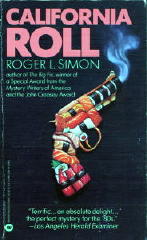
Actually, if had any idea of my then depressed state, he might have known that all he had to do was whistle. I was in the midst of a pronounced mid-life crisis somewhere between Gail Sheehy’s Passages and the advice column of a minor metropolitan daily. I felt like a human cliché. Most of the time I would sit around in my room in my bathrobe, listening to Leadbelly albums and bemoaning my situation: three months shy of my fortieth birthday and still a private detective with nothing to show for it but a leaky two-bedroom cottage on Wonderland Drive and a battered Porsche with a sever transmission problem. My political ideals, when I could remember them, felt like the rehash of a twenty-year-old Marcuse paperback. My work, when I had some, was boring. And my body, however hard I fought against it, was beginning its slow, inexorable slide to oblivion.
Beyond this, my kids were growing up and didn’t want much more to do with me than an occasional overpriced visit to a sushi bar, while my ex-wife, who had dropped out of law school to live with a movie producer with a chalet in Vail, still asked for alimony. And to top it all off, my own lovelife was in the doghouse since the glorious Louise went back to her nitwit stockbroker husband after three years because, after all, she had her security to think about. And all around me my sixties buddies were getting rich. “Fuck it, Moses,” they would say. “Reagan’s in the White House. If you can’t lick ’em, join ’em!”
Moses was, as far as I have been able to determine, the first counter-cultural PI in the books, starting out as a pot-smoking California hippie detective in 1973 and having a whole career of life-altering adventures from that point on, but always the same person, always with new problems, or so his books have been described to me. (I’m relying here on some of the comments I found after a quick Google through the Internet, with (as usual) Kevin Burton Smith at thrillingdetective.com having the most concise but illuminating things to say.)
Here’s the entire list of Moses Wine adventures. I’ve read only two of them, I’m sorry to say.
The Big Fix. Straight Arrow, trade pb, 1973.
Andre Deutsch, hc, UK, 1974.
Pocket, pb, March 1974.
Pocket, pb, September 1978.
Warner, pb, July 1984.
I Books, trade pb, July 2000.
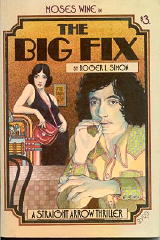
Wild Turkey. Straight Arrow, hc, 1974.
Pocket, pb, February 1976.
Warner, pb, September 1984.
I Books, trade pb, July 2000.
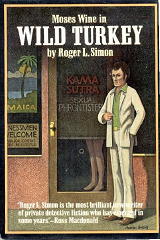
Peking Duck. Simon & Schuster, hc, June 1979.
Detective Book Club, reprint hc, 3-in-1 volume, Sept-Oct 1979.
Warner, pb, September 1987.
I Books, trade pb, November 2000.
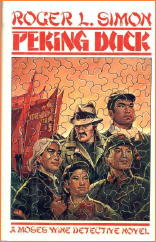
California Roll. Villard, hc, March 1985.
Warner, pb, June 1986.
I Books, trade pb, January 2001.
The Straight Man. Villard, hc, September 1986.
Warner, pb, October 1987.
I Books, trade pb, June 2001.
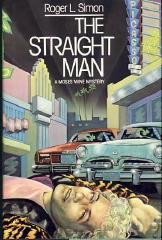
Raising the Dead. Villard, hc, July 1988.
Warner, pb, August 1989.
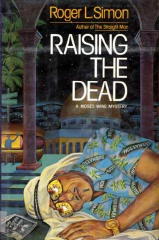
The Lost Coast. Harpercollins, hc, 1997.
I Books, trade pb, March 2000.
I Books, hc, May 2003.
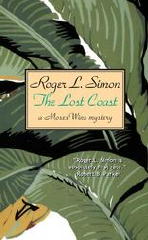
Director’s Cut. Atria, hc, June 2003.
I Books, trade pb, December 2005. [Scheduled but possibly never published.]
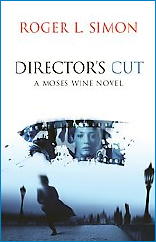
Getting back to California Roll, however, and as you can probably imagine, the match-up of Moses Wine with corporate California — the computer business in its early stages — does not go well. There is a parallel theme, not thinly disguised, in the fact that Alex Wiznitsky (aka The Wiz), the head of Tulip (not Apple), newly worth $234,000,000 and who hires Moses to be the new head of security — he also finds that immense, immeasurable wealth is not what it is cracked up to be. He, the Wiz, would rather be, one feels, back in his garage tinkering around on his own.
He, the Wiz, also says, on page 13, “They’re t-trying to take the company away from me, Moses.”
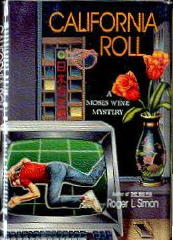
I don’t think the plot of the mystery adventure novel that follows makes a whole lot of sense, although it certainly follows the usual path of a private eye novel in practice, although with a sense that the latter is not entirely the sort of story Mr. Simon intended to tell.
Characters come on stage to amuse and entertain us for a while, and then they are seemingly jettisoned when the story verves off in another direction — to Japan, say, for several chapters — and then back again to California.
One excellent creation along these lines is Mr. Hodaka, a translator Moses hires in Japan who turns out also to be the writer of Japanese pulp detective stories and who eagerly finds the opportunity to be of assistance to Moses along those lines to be very exciting, along with his fellow members in the Maltese Falcon society. A girl named Laura Suzuki, on the other hand, whom Moses makes love to on page 62 (in brief but explicit detail), finds her role in the story (later on) much less to her liking.
On page 170 is a sort of semi-capsule summary: “… it was a two-tiered game … being played out on one level by large corporate entities and nation-states and on another by human beings struggling desperately for survival in this sad vale of tears.”
Which, if nothing else I’ve said so far, may give you an inkling of where either the book succeeds or fails. Or if it does not, here is another take on the book’s intentions — and ordinarily I perhaps should not do this, which is to quote the last two lines of the book (or that is to say, to quote a quote from Hagakure: The Book of the Samurai) — but if you were paying attention up above, there’s nothing in this that will surprise you, not an iota:
May 3rd, 2011 at 7:34 pm
[…] Previously reviewed by me on this blog was California Roll. You can find my comments here, along with a lengthy list of the Moses Wine novels. […]
January 14th, 2015 at 4:26 pm
I’ve not read much of the author’s works themselves, but I will enthusiastically vouch for the Richard Dreyfus movie, ‘The Big Fix’. Its wonderful. John Lithgow co-stars. A real treat; similar in style to ‘The Late Show’ (Art Carney, Lily Tomlin).